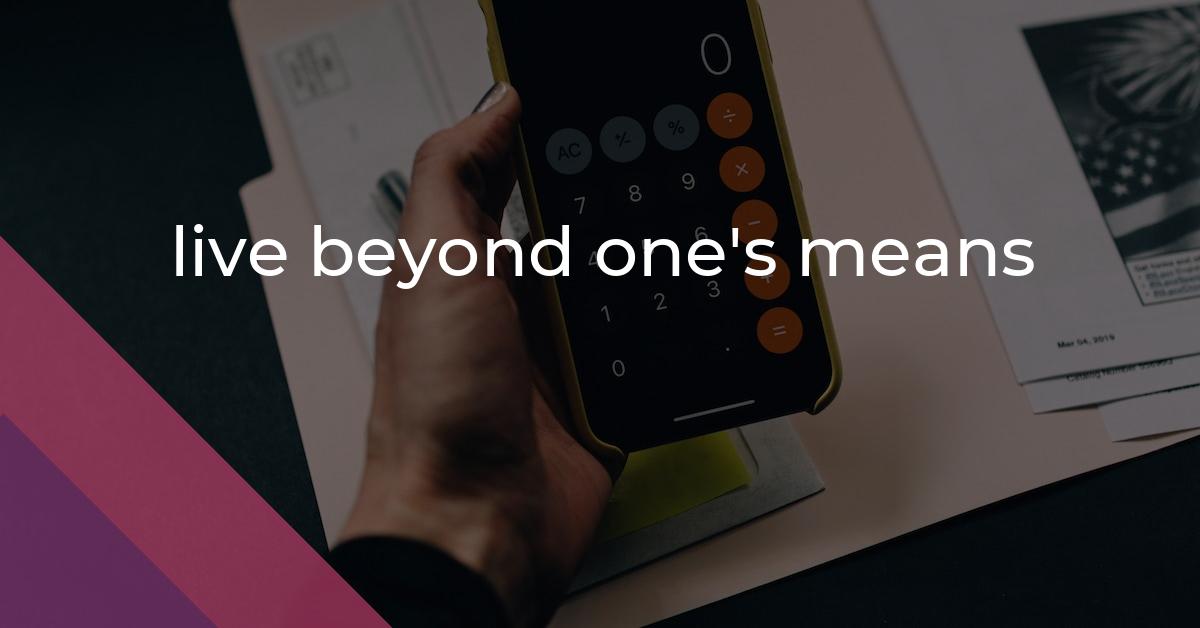live beyond one’s means: Idiom Meaning and Origin
What does ‘live beyond one's means’ mean?
The idiom "live beyond one's means" means spending more money than one can afford, often leading to financial difficulties or debt.

Idiom Explorer
The idiom "too rich for one's blood" means something is too expensive for someone's financial means or taste.
The idiom "out of pocket" means to be at a financial loss or to pay for something personally rather than using company funds. It is often used to express the idea of spending one's own money or being responsible for expenses that are not reimbursed.
The idiom "on the breadline" means to be in a state of poverty or financial hardship.
The idiom "one too many" means to have or consume more of something than is considered acceptable or appropriate.
The idiom "make ends meet" means to manage financially with the income one has, even if it is barely enough to cover expenses.
The idiom "lose one's shirt" means to suffer a significant financial loss or to lose all of one's money in a risky investment or endeavor.
The idiom "live paycheck to paycheck" means to spend all of one's income each month, barely managing to cover expenses without being able to save any money for emergencies or future needs.
The idiom *live over the brush* means to live outside the bounds of conventional societal expectations or norms, usually involving unconventional relationships or behavior.
The idiom "live on the edge" means to lead a risky or dangerous life, often seeking excitement or adrenaline. It implies a willingness to take risks and venture into uncertain or unconventional situations.
Excessive Spending: Unbridled Affluence
The idiom "live beyond one's means" refers to spending more money than one can afford. It means living a lifestyle that exceeds one's financial resources. The phrase has been used since the early 19th century and is commonly used today. This idiom highlights the consequences of unsustainable spending habits and emphasizes the importance of financial responsibility.
When we break down the words that make up this idiom, we can gain a deeper understanding of its meaning. "Live" refers to one's way of life, emphasizing the ongoing nature of the behavior. "Beyond" suggests surpassing or exceeding a certain limit or boundary. Lastly, "one's means" denotes the available resources or financial capabilities of an individual.
The idiom "live beyond one's means" serves as a cautionary reminder about the importance of financial responsibility and making prudent decisions. It warns against the allure of material possessions and societal pressures that may tempt individuals to overspend and accumulate debt. In a consumer-driven culture, where instant gratification is often favored over long-term financial stability, this idiom resonates.
Living beyond one's means can have severe consequences, leading to financial distress, debt, and even bankruptcy. It highlights the need for individuals to align their spending with their income and prioritize financial planning. This idiom emphasizes the importance of exercising restraint and making conscious choices when it comes to spending.
Understanding the idiom "live beyond one's means" is crucial in personal finance. It emphasizes the importance of mindful spending and responsible financial management. By considering one's means and aligning their lifestyle accordingly, individuals can avoid excessive debt and secure a more stable financial future.
While the idiom "live beyond one's means" provides a clear warning, it also allows room for interpretation. It prompts us to consider the complexities of personal finance, societal pressures, and individual circumstances that may influence our financial decisions. This idiom compels us to question our desires and aspirations, urging us to find a balance between financial stability and pursuing our dreams.
In essence, the idiom "live beyond one's means" encompasses a profound message about personal finance, fiscal prudence, and the choices we make in life. It emphasizes the consequences of unsustainable spending and encourages us to prioritize our financial well-being. It reminds us to make choices that align with our long-term goals. The enduring popularity of this idiom reflects its universal relevance and its ability to provoke reflection on the delicate balance between financial responsibility and the allure of a lavish lifestyle.
The idiom "live large" is related to "live beyond one's means." "Live large" refers to living an extravagant and luxurious lifestyle, often characterized by overspending and excessive indulgence. It is synonymous with "live beyond one's means" as both idioms convey the idea of exceeding one's financial resources in pursuit of a lavish way of life.
When someone is living large, they may prioritize spending on expensive material possessions, luxurious vacations, and fine dining, regardless of their current financial situation. This can lead to significant financial strain and debt accumulation over time. The idiom "live large" serves as a reminder of the potential consequences of unsustainable spending habits and encourages individuals to make more mindful choices when it comes to their finances.
The idiom "live paycheck to paycheck" is also related to "live beyond one's means." "Live paycheck to paycheck" describes a financial situation where an individual spends all or nearly all of their income each month, leaving little to no savings or financial cushion. This often occurs when someone's expenses exceed their income, leading to a cycle of barely getting by until the next paycheck arrives.
Living paycheck to paycheck can be a result of living beyond one's means, as individuals may be spending more than they can afford and relying on their income from the next paycheck to sustain their lifestyle. This financial instability can make it challenging to cover unexpected expenses or save for the future, creating a cycle of financial stress and uncertainty. The idiom "live paycheck to paycheck" serves as a reminder of the importance of budgeting, saving, and making responsible financial choices.
The idiom "live off" is another idiom related to "live beyond one's means." "Live off" refers to relying on someone else or external sources for financial support or sustenance. When someone is living off someone or something else, they are depending on it to cover their living expenses or provide for their needs.
Living off someone or something can be a consequence of living beyond one's means, as individuals may find themselves unable to sustain their lifestyle on their own income or resources. They may turn to others for financial assistance, whether it be borrowing money, relying on a partner's income, or seeking help from government programs or charities. The idiom "live off" serves as a reminder of the potential consequences of unsustainable spending habits and the importance of financial self-sufficiency.
Example usage
Examples of how the idiom live beyond one's means can be used in a sentence are:
1. She constantly buys expensive designer clothes and dines at expensive restaurants, clearly living beyond her means.
2. Despite earning a modest income, he took out multiple loans to purchase luxury cars, clearly living beyond his means.
3. The couple's extravagant vacations and luxurious lifestyle indicate that they are living beyond their means.
More "Finance" idioms



